
📣 Final version of our @elife.bsky.social article is now online! We show that in individuals with moderately low baseline performance, methamphetamine reduces the tendency to misinterpret high outcome noise. 🥳
elifesciences.org/articles/101...
@alexweuthen.bsky.social
Psychologist & neuroscientist | Neuropsychotherapy basis in cholinergic, aminergic & cardiorespiratory neuromodulatory dynamics of brain networks integrity & oscillatory connectivity | PostDoc @ Uni Hospital Jena & German Center for Mental Health (DZPG)

📣 Final version of our @elife.bsky.social article is now online! We show that in individuals with moderately low baseline performance, methamphetamine reduces the tendency to misinterpret high outcome noise. 🥳
elifesciences.org/articles/101...
Check out our latest open data release. n=240, most with a dsm-5 dx with extensive phenotying (~100 scales/subscale), rest and task functional imaging. See @carrisacocuzza.bsky.social's thread below for deets and links 👇🏾👇🏾👇🏾
04.06.2025 23:45 — 👍 10 🔁 7 💬 0 📌 1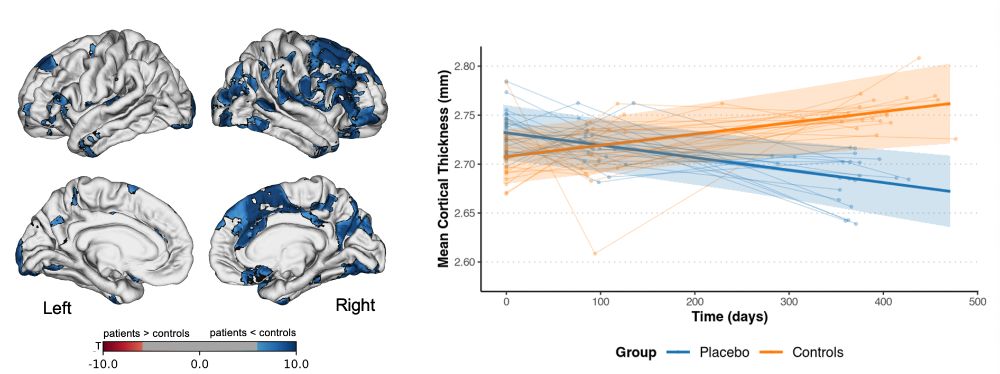
🧠💊New preprint differentiating antipsychotic medication vs. illness effects on cortical thickness in people w/ psychosis.
Finding: People receiving placebo show prominent cortical thinning over 1st year of illness, whereas those receiving antipsychotics do not. 1/3
www.medrxiv.org/content/10.1...
The study was part of my PhD project and supported by the German research foundation (DFG), Project 13 in the Research Training Group GRK 2413 “The ageing synapse” (SynAGE). Thanks goes to the co-authors @hanskirschner.bsky.social & Markus Ullsperger, reviewers, editors and study participants. 13/13
05.02.2025 10:33 — 👍 1 🔁 0 💬 0 📌 0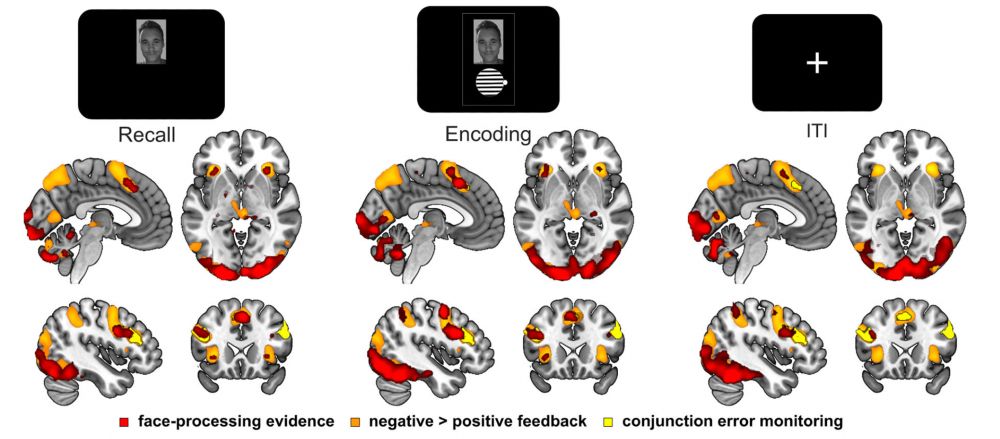
While the exact location in pMFC and dlPFC regions varied between different memory epochs, other methods such as magneto- or electroencephalography recordings may capture in which temporal dynamics attentional allocation processes emerge. 12/n
05.02.2025 10:06 — 👍 0 🔁 0 💬 1 📌 0
The regions found in association with increased face-processing evidence were assigned to large-scale brain networks and showed the strongest contributions of a visual network, followed by dorsal attention and frontoparietal networks. 11/n
05.02.2025 10:04 — 👍 0 🔁 0 💬 1 📌 0
Using linear mixed model analyses, a link between face-processing evidence and both, the need for attentive encoding as well as subsequent recall success was found. 10/n
05.02.2025 10:02 — 👍 0 🔁 0 💬 1 📌 0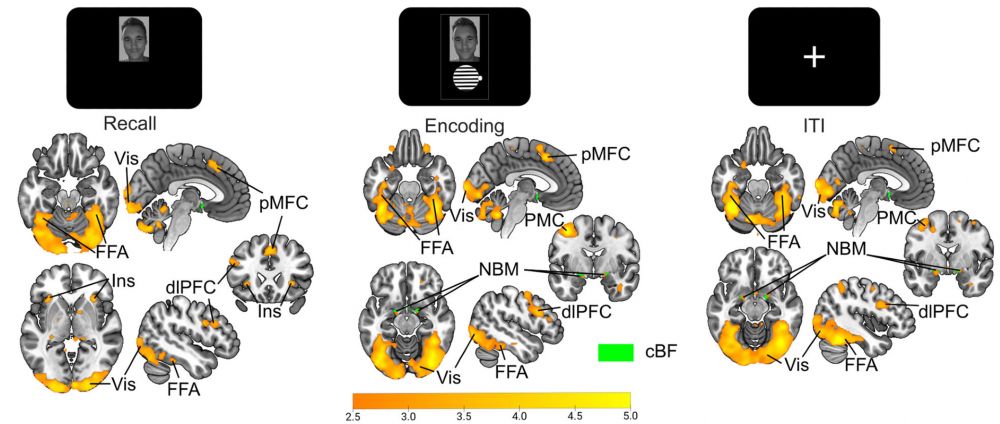
This measure was applied to the main memory task. The hemodynamic topography showed a reliable pattern beyond the FFA region itself in regions among pMFC, dlPFC and visual cortex, and during encoding also overlapping with a cytoarchitectonic mask of the basal forebrain. 9/n
05.02.2025 10:00 — 👍 0 🔁 0 💬 1 📌 0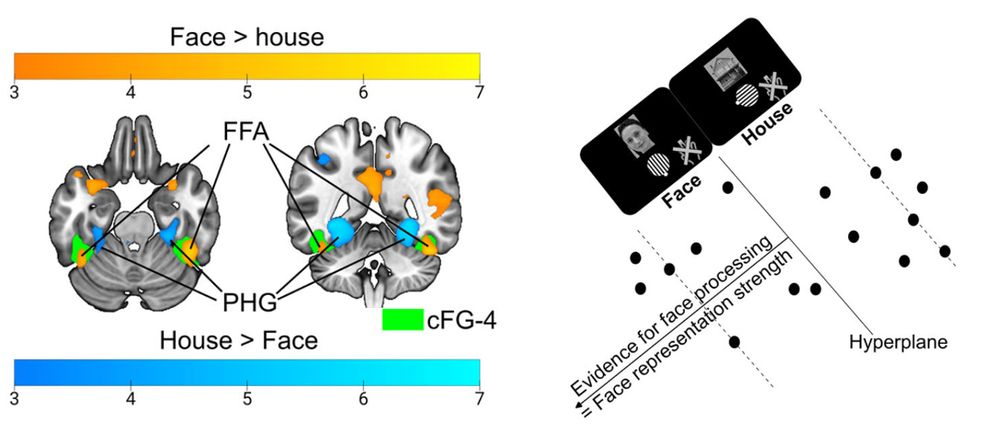
For each participant, the most responsive voxels from the localizer task which fell within a cytoarchitectonic fusiform gyrus mask were identified as individualized fusiform face area voxels and a cross-validated model was trained to evaluate face-processing evidence. 8/n
05.02.2025 09:58 — 👍 0 🔁 0 💬 1 📌 0
We hypothesized that attentional allocation to the relevant stimulus category drives successful performance adaptations. To develop a model for the quantification of attention to faces, participants performed a 1-back localizer task, including face and house stimuli. 7/n
05.02.2025 09:56 — 👍 0 🔁 0 💬 1 📌 0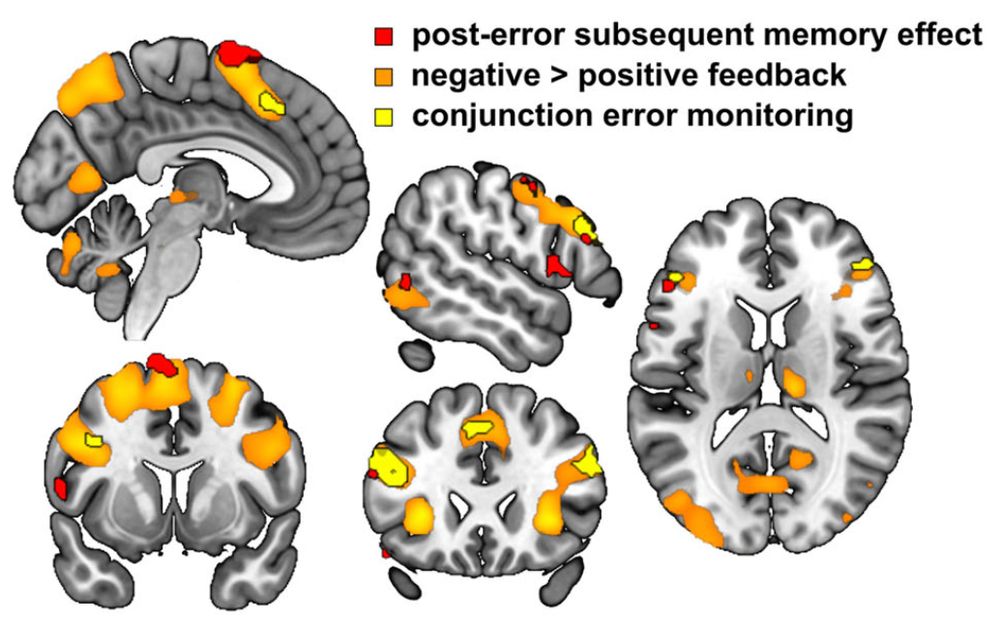
The post-error subsequent memory effect overlapped with the negative feedback contrast, which suggest a link between memory error detection and following learning adaptations.
But how are improvements on the next learning attempt implemented? 6/n
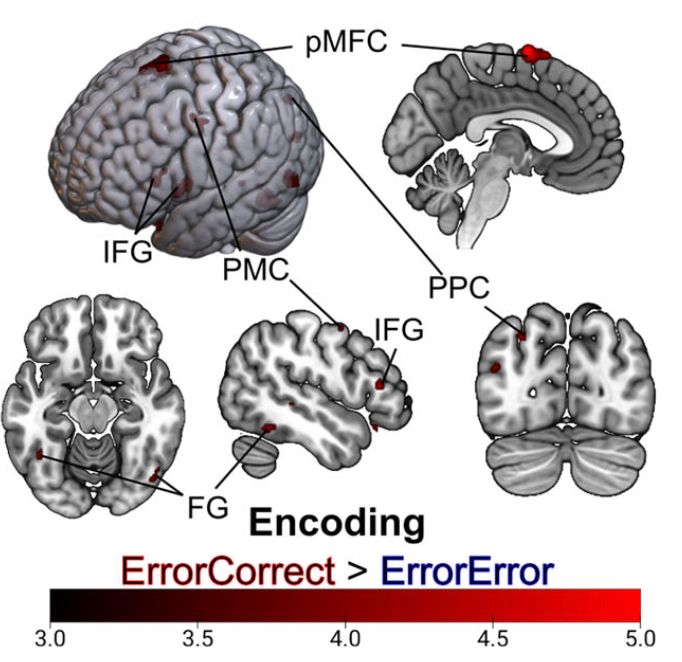
The regions we found mostly reflected previously described regions in meta-analysis on the subsequent memory effect, although pMFC’s function has not been addressed. 5/n
05.02.2025 09:52 — 👍 0 🔁 0 💬 1 📌 0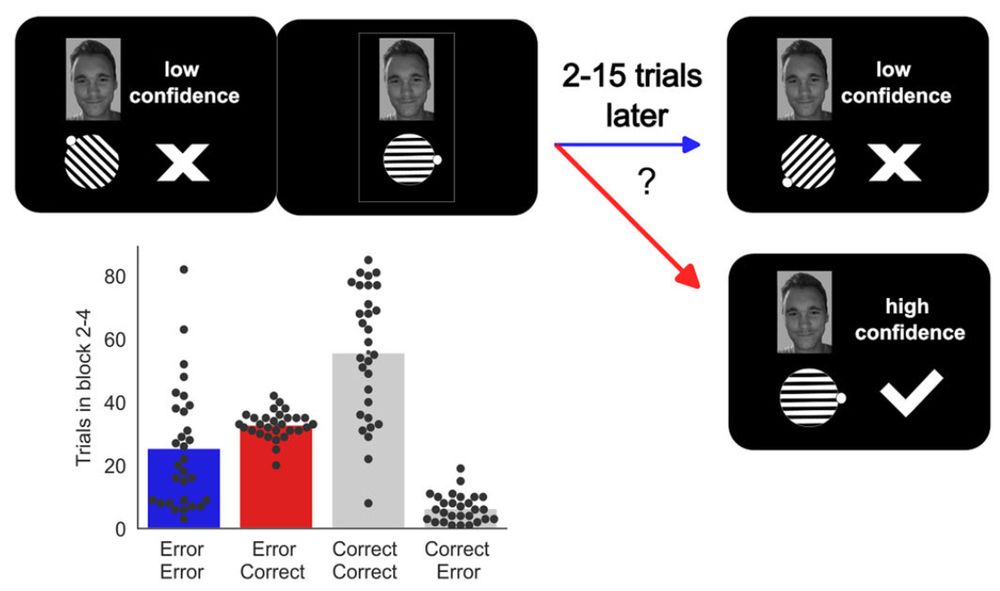
To understand which neurophysiological adaptations underly successful memory formation, we assessed what differentiates error-following encoding epochs with and without future recall success. 4/n
05.02.2025 09:50 — 👍 0 🔁 0 💬 1 📌 0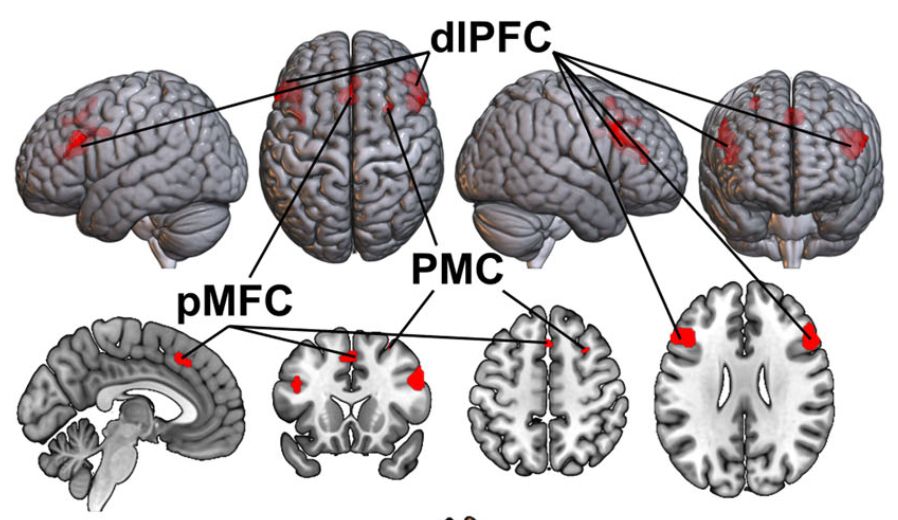
The conjunction of error monitoring contrasts converged in posterior medial frontal cortex (pMFC), dorsolateral prefrontal cortex (dlPFC) and premotor cortex (PMC). 3/n
05.02.2025 09:48 — 👍 0 🔁 0 💬 1 📌 0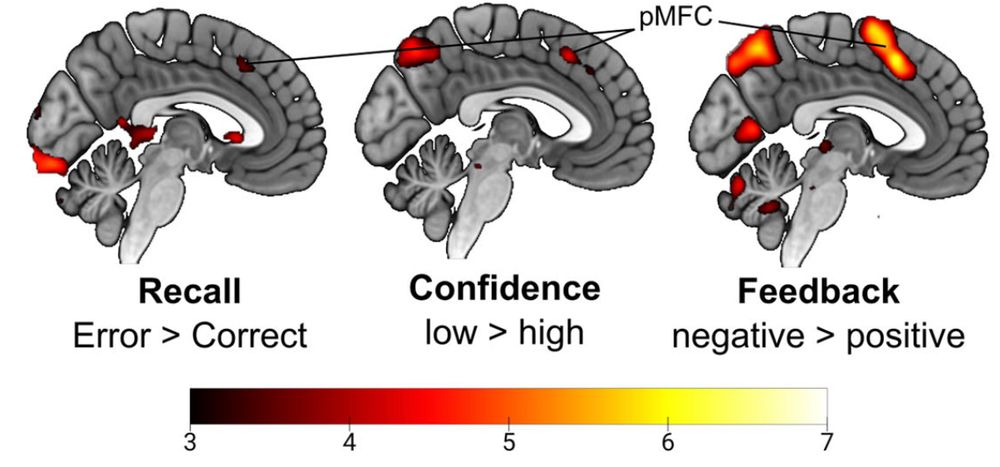
We assessed memory error detection processes showing increased hemodynamic responses in contrasts for failed recall, low confidence and negative feedback. 2/n
05.02.2025 09:47 — 👍 0 🔁 0 💬 1 📌 0
To capture error monitoring and memory processes, we developed a cognitive paradigm to-be-performed during continuous fMRI scanning. In this paradigm, participants learned to associate face stimuli with different orientations of gabor patches.
05.02.2025 09:41 — 👍 0 🔁 0 💬 1 📌 0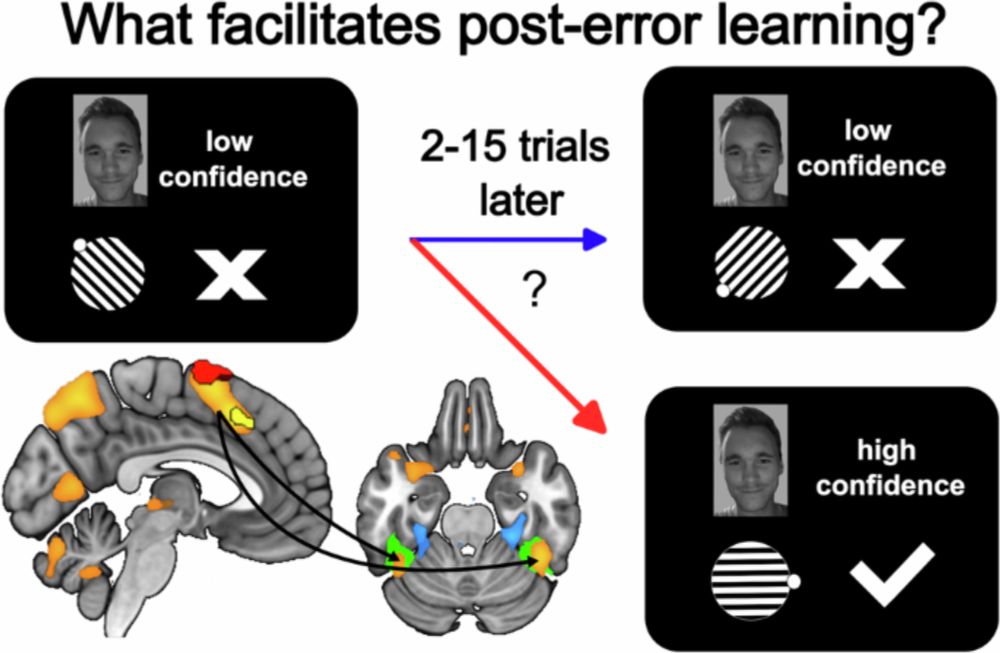
Learning an association does not always succeed on the first attempt. What are the brain mechanisms underlying adaptations in memory formation on following learning attempts?
We addressed this question by quantifying single-trial fMRI stimulus processing evidence: www.nature.com/articles/s44...
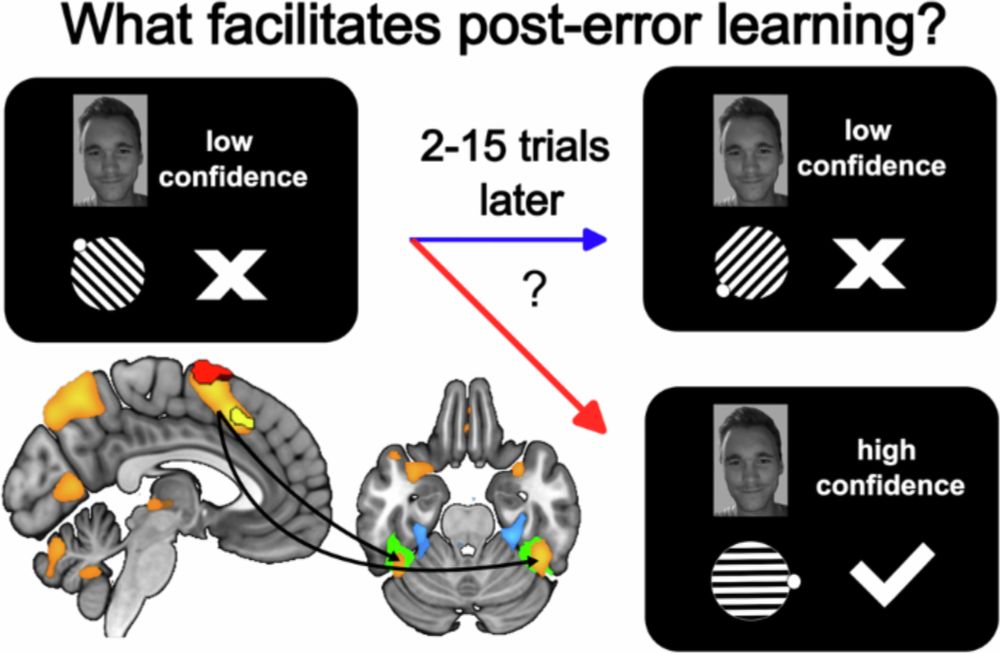
With single-trial analysis, this fMRI study shows that activity in brain areas associated with error monitoring & cognitive control differentiates between items remembered correctly vs those where mistakes persist.
@alexweuthen.bsky.social @hanskirschner.bsky.social
www.nature.com/articles/s44...